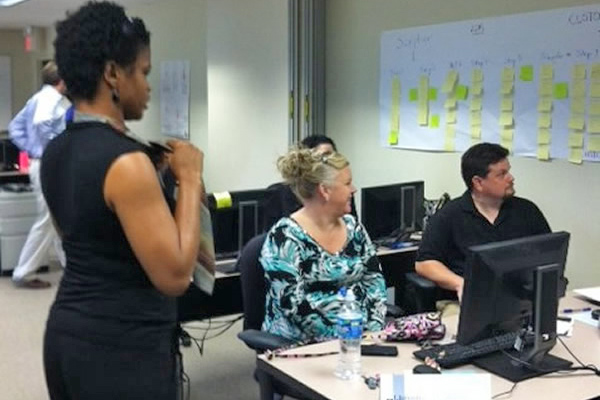
PCS program
Delaware courts participate in process improvement workshops
2:15 p.m., Nov. 8, 2012--Managers and administrators from five Delaware courts participated in a series of process improvement workshops this summer, with the goal of streamlining and improving the work systems in their courts.
Coordinated by the Administrative Office of the Courts (AOC), the training consisted of four workshops covering how the tools and techniques of process improvement can be used in their specific court environments to improve efficiency.
Campus Stories
From graduates, faculty
Doctoral hooding
The ongoing process improvement efforts coincide with the Delaware Courts Automation Project (DCAP), the courts’ case management modernization project featuring such improvements as the expansion of e-filing options, and consolidated access to electronic documents and case data used by the courts.
Already a national leader in this area, Delaware was one of the first states to use e-filing and electronic docketing systems for civil cases.
Tom Mraz of AOC facilitated the partnership with the University of Delaware’s Division of Professional and Continuing Studies in order to provide the UD training sessions that were specifically tailored to the process improvement goals of the Delaware courts. Mraz also participated in the workshops along with 18 other court administrators and managers.
In his capacity as the functional lead for DCAP, Mraz works with the courts to help define their needs and document the desired processes and results of the automation project.
The planned process improvement efforts will serve as a preliminary to many of the courts submitting their processes to the Delaware Courts Automation Project, with the goal of improving and streamlining those procedures before they’re automated or systematized.
As Mraz explained, “The subject matter experts who were involved in the process improvement training represent their respective courts in an operational expert capacity. They’re the administrators, management analysts and supervisors responsible for ensuring their courts’ operations are running as efficiently as possible. Many of them write the procedures for their courts, so this is a good opportunity to improve our skills in doing that.”
Participating courts included the Superior Court, Court of Common Pleas, Family Court, Justice of the Peace Court and Chancery Court, plus representatives from the AOC, including the Judicial Information Center and the Office of State Court Collections Enforcement.
Key ideas covered in the workshops included documenting existing work systems, identifying any inefficiencies and their root causes, and using solution identification techniques to improve those processes. Each participant came to the workshop prepared to document and analyze an existing work process from their court's procedures.
Explained Mraz, “Our hope is, that by engaging key representatives from each of the courts, that we can expand process improvement initiatives on a global level, in all the units, using these tools to analyze and improve the courts’ processes. We’re trying look at our processes critically, and identify what the impediments may be to providing our services as efficiently and effectively as we can.”
Charlotte Walsh is a management analyst with the Justice of the Peace Court who participated in the workshops. For a hands-on case study from the Justice of the Peace Court, she analyzed the court’s video arraignment process, with the goal of streamlining the process, and eventually expanding its use.
“Speaking for the Justice of the Peace Courts,” said Walsh, “our administration is interested in making improvements within our courts that benefit both the court staff and the public we serve. We are taking a hard look at how we do business today and how we can do business tomorrow because we don’t want to automate a bad process or bad data going forward.”
Added Walsh, “One of the questions we ask ourselves is, ‘If there were no limitations, how would we do it?’ You would be amazed at some of the ideas that come about.”
“The four-week course gave an opportunity for a cursory review,” explained Mraz. “However, some of the courts have taken their initial workshop analysis and already engaged in detailed process mapping, data collection plans, and a thorough analysis to see how they could address the processes in their court.”
Added Mraz, “Process analysis and improvement will be part of the ongoing process for the automation project. We’re going to structure it in, so it’s part of the process before any DCAP requirements analysis takes place, and the AOC will continue to work with the courts, to critically analyze our processes and look for better ways to do business.”
The UD course was facilitated through the Division of Professional and Continuing Studies and customized for the Delaware courts. The program was taught by Steve Horah, who is a seasoned faculty member from the University’s Lean Six Sigma Green Belt Certificate.
Horah elaborated on the benefits of being able to customize a course like this: “The primary benefit of a targeted training approach is that we focus on real processes within a participating group, and work to improve them during the course of the training program. The Delaware courts participants were fully engaged from the outset of the program and much to their credit eagerly worked on actual court system process improvement opportunities.”
The workshops were extremely well received by participants, many of whom commented enthusiastically about the value of the tools and techniques covered, and their intention to implement the techniques to analyze and improve their courts’ processes.
For more information about customized programs at UD, visit this website or contact George Irvine at girvine@udel.edu or 302-831-7858.
Article by Nora Riehl Zelluk
Photo courtesy of Steve Horah








